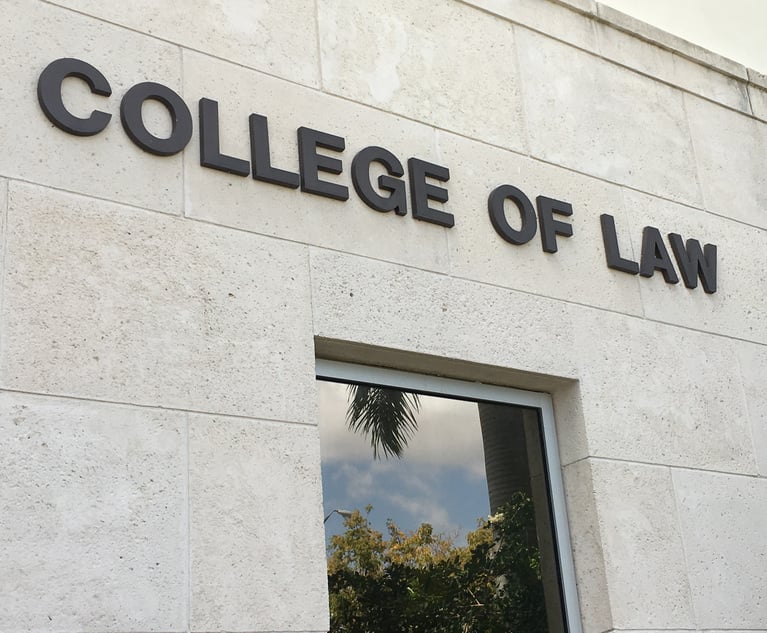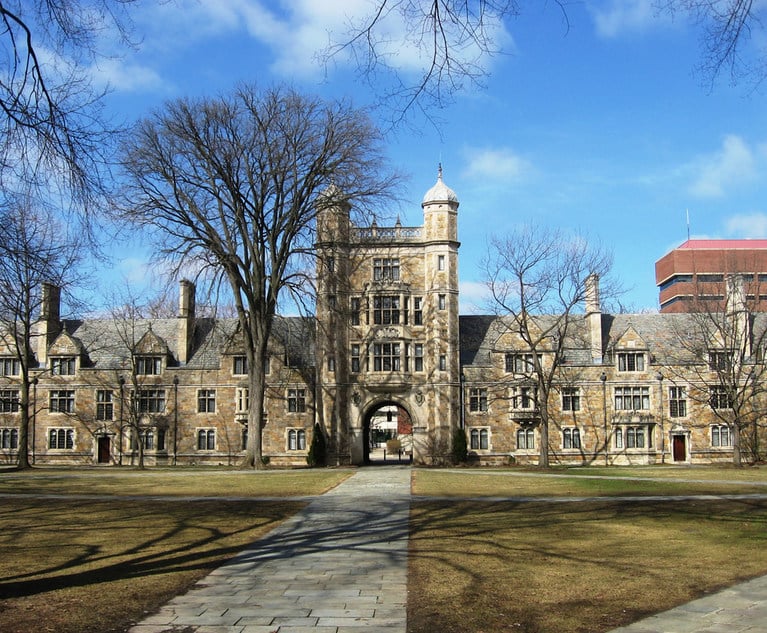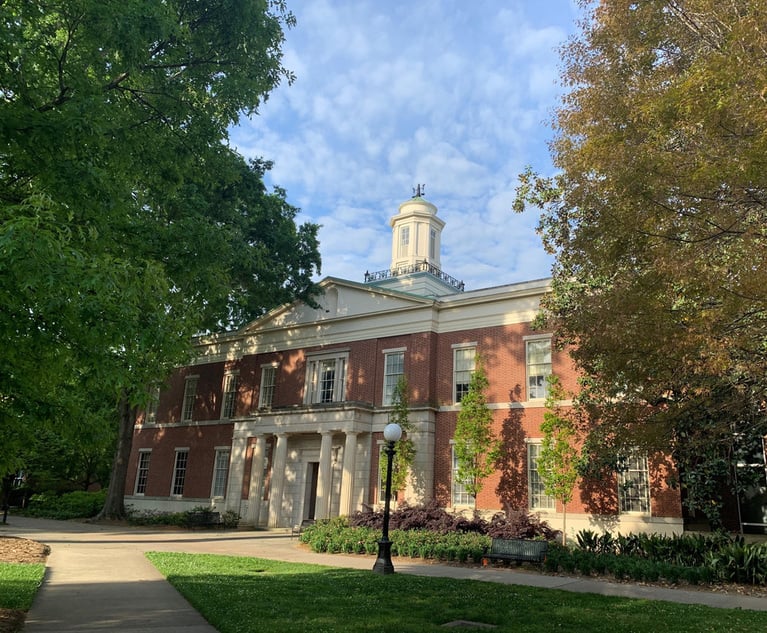Surprise Findings on Laptop Use in Law School Classrooms
A new study concludes that law students who use laptops in class do as well as those don't use computers—as long as professors put the kibosh on Facebook and the like.
January 18, 2018 at 05:14 PM
4 minute read
Law professors should think twice before banishing laptops from their classrooms.
That's the takeaway of a new law review article challenging the popular notion that the siren call of Facebook and Reddit are too tempting for students to resist in class, and the widely held view that taking notes by hand is a more effective way to learn.
Laptop users in Ruth Colker's constitutional law class at Ohio State University Michael E. Moritz College of Law earned comparable grades to those who voluntarily eschewed computers in class, according to her article in the Cardozo Law Review, titled “Universal Design: Stop Banning Laptops!”
Colker recommends that law professors allow their students to decide for themselves whether to use laptops on the grounds that students learn best in different ways. At the same time, professors should make clear that using the internet for nonclass purposes in strictly prohibited.
“I'm reluctant to make a choice for my students for all sorts of reasons,” Colker said in an interview. “The data suggests that students seem to make the right choice for themselves.”
Not only that, but across-the-board laptop bans force students with disabilities who need to use laptops to out themselves to professors and classmates by seeking exceptions, said Colker, an expert in disability law.
There is no shortage of opinions when it comes to laptops in the law classroom, and outright bans are not uncommon. (U.S. Supreme Court Justice Neil Gorsuch didn't allow laptops as a visiting professor at the University of Colorado School of Law, for example.)
A 2013 study found that second- and third-year law students are more likely than their first-year counterparts to goof off on their laptops during class, while a separate study in 2012 found that second-year law students spent 42 percent of their class time using their laptops for nonacademic purposes.
Some professors worry that laptops create a less engaging classroom environment with students furiously typing instead of participating in discussions, while others cite research showing that they retain more information when taking notes by hand.
Colker said she became interested in the laptop question three years ago when a videotape of one of her small section classes captured a student watching a cooking show as she taught.
“I was horrified,” she said. “I thought, 'I need to do something.'”
Her concern wasn't so much for the student watching the show—he lost his laptop privileges—but for the others around him who were also distracted, she said.
Colker introduced a policy whereby any student who wants to use a laptop in class must request permission in writing and pledge not to use the internet for nonacademic purposes. She also shares research showing that those who take notes by hand tend to outperform those who take verbatim notes on their computers.
Colker then conducted a study of the 57 students in her spring 2016 constitutional law class. Among them, 25 requested the use of a laptop while 32 did not. She assumed that the laptop users would underperform based on published studies, but they did just as well as the nonlaptop users. Those results held even when Colker took credentials, including her students' scores on the Law School Admission Test and undergraduate grades, into account.
Conversations with her students revealed that some opted not to use laptops because they knew they couldn't resist browsing the internet or checking emails, while others who used laptops said they preferred to be able to access course materials online during class and could more easily create study outlines by typing their notes.
In the end, law professors should trust their students to know what is best for them but should also lay out firm ground rules for laptop use, Colker said.
“In law, we are always teaching our students that answers are murky, there are two sides to most issues, and one needs to assess facts with care,” her article reads. “A professor's reflexive 'no-laptop' policy fails to hold us to these high standards.”
This content has been archived. It is available through our partners, LexisNexis® and Bloomberg Law.
To view this content, please continue to their sites.
Not a Lexis Subscriber?
Subscribe Now
Not a Bloomberg Law Subscriber?
Subscribe Now
NOT FOR REPRINT
© 2025 ALM Global, LLC, All Rights Reserved. Request academic re-use from www.copyright.com. All other uses, submit a request to [email protected]. For more information visit Asset & Logo Licensing.
You Might Like
View All
Florida Law Schools Are Seeing a Bump in Applications for 2025, After Recent Declines at Flagship Schools
3 minute read
Law School Applications are Up Across the Country. Law Deans Aren't Sure Why
6 minute read

'None of Us Like It': How Expedited Summer Associate Recruiting Affects Law Students and the Firms Hiring Them
Trending Stories
- 1CFPB Labor Union Files Twin Lawsuits Seeking to Prevent Agency's Closure
- 2Crypto Crime Down, Hacks Up: Lawyers Warned of 2025 Security Shake-Up
- 3Atlanta Calling: National Law Firms Flock to a ‘Hotbed for Talented Lawyers’
- 4Privacy Suit Targets Education Department Over Disclosure of Student Financial Data to DOGE
- 5Colwell Law Group Founder Has Died in Skiing Accident
Who Got The Work
J. Brugh Lower of Gibbons has entered an appearance for industrial equipment supplier Devco Corporation in a pending trademark infringement lawsuit. The suit, accusing the defendant of selling knock-off Graco products, was filed Dec. 18 in New Jersey District Court by Rivkin Radler on behalf of Graco Inc. and Graco Minnesota. The case, assigned to U.S. District Judge Zahid N. Quraishi, is 3:24-cv-11294, Graco Inc. et al v. Devco Corporation.
Who Got The Work
Rebecca Maller-Stein and Kent A. Yalowitz of Arnold & Porter Kaye Scholer have entered their appearances for Hanaco Venture Capital and its executives, Lior Prosor and David Frankel, in a pending securities lawsuit. The action, filed on Dec. 24 in New York Southern District Court by Zell, Aron & Co. on behalf of Goldeneye Advisors, accuses the defendants of negligently and fraudulently managing the plaintiff's $1 million investment. The case, assigned to U.S. District Judge Vernon S. Broderick, is 1:24-cv-09918, Goldeneye Advisors, LLC v. Hanaco Venture Capital, Ltd. et al.
Who Got The Work
Attorneys from A&O Shearman has stepped in as defense counsel for Toronto-Dominion Bank and other defendants in a pending securities class action. The suit, filed Dec. 11 in New York Southern District Court by Bleichmar Fonti & Auld, accuses the defendants of concealing the bank's 'pervasive' deficiencies in regards to its compliance with the Bank Secrecy Act and the quality of its anti-money laundering controls. The case, assigned to U.S. District Judge Arun Subramanian, is 1:24-cv-09445, Gonzalez v. The Toronto-Dominion Bank et al.
Who Got The Work
Crown Castle International, a Pennsylvania company providing shared communications infrastructure, has turned to Luke D. Wolf of Gordon Rees Scully Mansukhani to fend off a pending breach-of-contract lawsuit. The court action, filed Nov. 25 in Michigan Eastern District Court by Hooper Hathaway PC on behalf of The Town Residences LLC, accuses Crown Castle of failing to transfer approximately $30,000 in utility payments from T-Mobile in breach of a roof-top lease and assignment agreement. The case, assigned to U.S. District Judge Susan K. Declercq, is 2:24-cv-13131, The Town Residences LLC v. T-Mobile US, Inc. et al.
Who Got The Work
Wilfred P. Coronato and Daniel M. Schwartz of McCarter & English have stepped in as defense counsel to Electrolux Home Products Inc. in a pending product liability lawsuit. The court action, filed Nov. 26 in New York Eastern District Court by Poulos Lopiccolo PC and Nagel Rice LLP on behalf of David Stern, alleges that the defendant's refrigerators’ drawers and shelving repeatedly break and fall apart within months after purchase. The case, assigned to U.S. District Judge Joan M. Azrack, is 2:24-cv-08204, Stern v. Electrolux Home Products, Inc.
Featured Firms
Law Offices of Gary Martin Hays & Associates, P.C.
(470) 294-1674
Law Offices of Mark E. Salomone
(857) 444-6468
Smith & Hassler
(713) 739-1250









